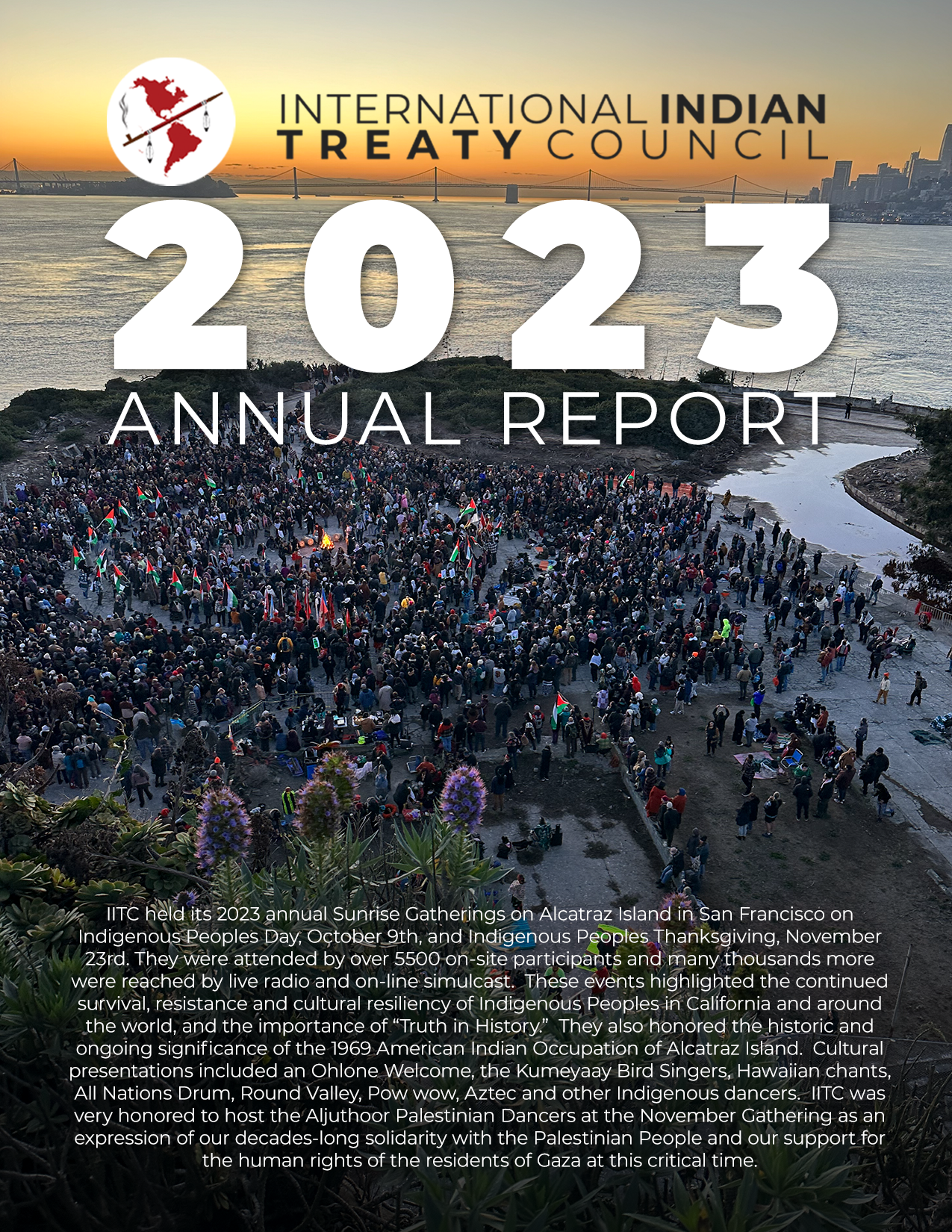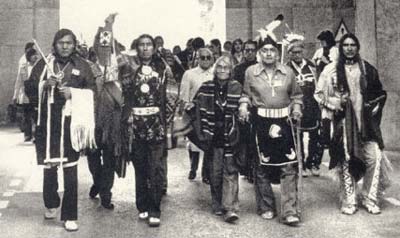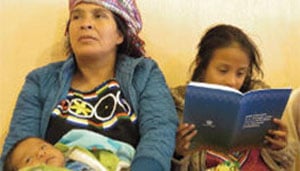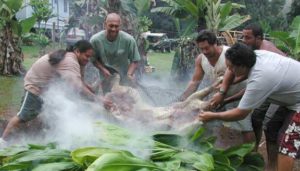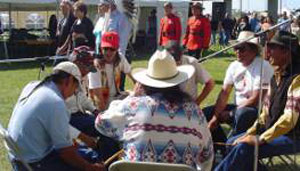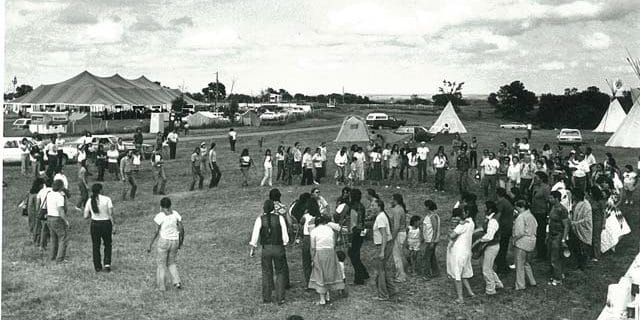Shasta County, California: International Indian Treaty Council (IITC) affiliate Pit River Tribe is celebrating two historic victories protecting their sacred places and reinstating jurisdiction over their traditional territories in Northern California. These include the defeat of a massive industrial wind farm project, which threatened an area of significant environmental and cultural importance on October 21, 2021, as well as the return of 786 acres of ancestral land by the Pacific Gas and Electric Company (PG&E) on November 5, 2021. This land was originally purchased in the early 1900s by Mt. Shasta Power using what tribal members described as “deceitful and coercive” methods.
Pit River, a federally recognized Tribe, composed of 11 bands of Achumawi and Atsugewi speaking Peoples, has lived in and stewarded land in present-day Shasta, Lassen, Modoc, and Siskiyou counties and beyond since time immemorial. Pit River, like other California Indigenous Peoples, survived several waves of colonial genocide, including the California Goldrush, forced relocation, government-backed massacres, boarding schools, and other assimilation programs.
Houston-based energy corporation ConnectGen proposed the Fountain Wind project in Shasta County in 2018. This proposal included the installation of over 70 massive wind turbines on an undeveloped mountain of great cultural and ecological significance. The Tribe immediately launched a campaign to oppose the project. On June 22, 2021, after 10 hours of testimony from tribal members, local residents, and IITC, the Shasta County Planning Commissioners voted 5-0 against the project. ConnectGen appealed the decision, and on October 26, 2021, the Shasta County Board of Supervisors voted 4-1 to deny the company’s appeal after 20 hours of public testimonies.
Agnes Gonzalez, Pit River Tribal Chairwoman, confirmed that “Tribal members stood strong speaking from their hearts” and criticized the “green-washing” of the Fountain Wind project. The proposed plans would have required a major building effort endangering sensitive animal and plant habitats while also contributing to fire dangers in the region. The construction would have produced a larger carbon footprint than what would have been offset during the project’s lifetime, according to Brandy McDaniels, Madesi Band Cultural Representative for the Pit River Tribe.
Gregory Feather Wolfin, Pit River Tribe Environmental Director, underscored that the campaign to defeat the project (which united tribal, environmental, Indigenous rights, and public interest advocates) demonstrated the inextricable ties between the defense of Indigenous sacred places, Tribal sovereignty, and the protection of sensitive environments in drought and fire-ravaged California.
IITC Board member Radley Davis, a respected Pit River cultural leader from the Illmawi Band, celebrated the victory, confirming that “this mega wind project would have forever erased ancestral, sacred and ceremonial sites, decimated eagles, hawks, bats, and would have placed miles of electrical lines through forest lands already at extremely high fire risk. Our Nation stood together with our neighbors and allies to protect our homes, lands, and natural resources against powerful interests. Pit River endorsed the UN Declaration on the Rights of Indigenous Peoples in 2012, which strengthened this successful effort to defend our rights”.
In a second major victory, on November 5, the Pit River Tribe gathered to celebrate the return of 789 acres of land within the ancestral territories of the Illmawi and Atsugewi bands, which was officially announced to the public on October 29. The return of this land to tribal stewardship was historic for Pit River and all California Indigenous Peoples organizing to call for #LandBack in a united effort to achieve the return of stolen lands. “All PG&E and publicly managed lands within our 100 square mile territory should be returned to the Pit River Tribe”, states Morning Star Gali, Pit River Tribal Member, and IITC California Tribal and Community Liaison. “Protection of our sacred lands and waterways cannot effectively happen without Tribal management and stewardship. Land Back is more than a hashtag; it is the opportunity to heal our Nations.”
IITC is an organization of Indigenous Peoples from North, Central, South America, the Arctic, Caribbean, and Pacific working for the sovereignty and self-determination of Indigenous Peoples and the recognition and protection of Indigenous rights, Treaties, traditional cultures, and sacred lands. IITC was founded on the Standing Rock Reservation in South Dakota in June 1974. In 1977, the IITC became the first Indigenous Peoples’ organization to be recognized as a Non- Governmental Organization (NGO) with Consultative Status to the United Nations Economic and Social Council. In 2011, IITC was the first to be upgraded to General Consultation Status in recognition of its active participation in a wide range of international bodies and processes in order to advance, defend and recognize the rights of Indigenous Peoples.
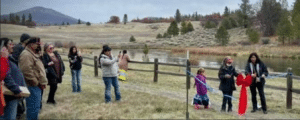
Pit River Chairwoman Agnes Gonzalez & Illmawi Elder Cecelia Silvas cut the ribbon during the land return celebration, November 5, 2021
Share this post
The International Indian Treaty Council Joins The Pit River Tribe In Celebrating Historic Land And Cultural Rights Victories
Shasta County, California: International Indian Treaty Council (IITC) affiliate Pit River Tribe is celebrating two historic victories protecting their sacred places and reinstating jurisdiction over their traditional territories in Northern California. These include the defeat of a massive industrial wind farm project, which threatened an area of significant environmental and cultural importance on October 21, 2021, as well as the return of 786 acres of ancestral land by the Pacific Gas and Electric Company (PG&E) on November 5, 2021. This land was originally purchased in the early 1900s by Mt. Shasta Power using what tribal members described as “deceitful and coercive” methods.
Pit River, a federally recognized Tribe, composed of 11 bands of Achumawi and Atsugewi speaking Peoples, has lived in and stewarded land in present-day Shasta, Lassen, Modoc, and Siskiyou counties and beyond since time immemorial. Pit River, like other California Indigenous Peoples, survived several waves of colonial genocide, including the California Goldrush, forced relocation, government-backed massacres, boarding schools, and other assimilation programs.
Houston-based energy corporation ConnectGen proposed the Fountain Wind project in Shasta County in 2018. This proposal included the installation of over 70 massive wind turbines on an undeveloped mountain of great cultural and ecological significance. The Tribe immediately launched a campaign to oppose the project. On June 22, 2021, after 10 hours of testimony from tribal members, local residents, and IITC, the Shasta County Planning Commissioners voted 5-0 against the project. ConnectGen appealed the decision, and on October 26, 2021, the Shasta County Board of Supervisors voted 4-1 to deny the company’s appeal after 20 hours of public testimonies.
Agnes Gonzalez, Pit River Tribal Chairwoman, confirmed that “Tribal members stood strong speaking from their hearts” and criticized the “green-washing” of the Fountain Wind project. The proposed plans would have required a major building effort endangering sensitive animal and plant habitats while also contributing to fire dangers in the region. The construction would have produced a larger carbon footprint than what would have been offset during the project’s lifetime, according to Brandy McDaniels, Madesi Band Cultural Representative for the Pit River Tribe.
Gregory Feather Wolfin, Pit River Tribe Environmental Director, underscored that the campaign to defeat the project (which united tribal, environmental, Indigenous rights, and public interest advocates) demonstrated the inextricable ties between the defense of Indigenous sacred places, Tribal sovereignty, and the protection of sensitive environments in drought and fire-ravaged California.
IITC Board member Radley Davis, a respected Pit River cultural leader from the Illmawi Band, celebrated the victory, confirming that “this mega wind project would have forever erased ancestral, sacred and ceremonial sites, decimated eagles, hawks, bats, and would have placed miles of electrical lines through forest lands already at extremely high fire risk. Our Nation stood together with our neighbors and allies to protect our homes, lands, and natural resources against powerful interests. Pit River endorsed the UN Declaration on the Rights of Indigenous Peoples in 2012, which strengthened this successful effort to defend our rights”.
In a second major victory, on November 5, the Pit River Tribe gathered to celebrate the return of 789 acres of land within the ancestral territories of the Illmawi and Atsugewi bands, which was officially announced to the public on October 29. The return of this land to tribal stewardship was historic for Pit River and all California Indigenous Peoples organizing to call for #LandBack in a united effort to achieve the return of stolen lands. “All PG&E and publicly managed lands within our 100 square mile territory should be returned to the Pit River Tribe”, states Morning Star Gali, Pit River Tribal Member, and IITC California Tribal and Community Liaison. “Protection of our sacred lands and waterways cannot effectively happen without Tribal management and stewardship. Land Back is more than a hashtag; it is the opportunity to heal our Nations.”
IITC is an organization of Indigenous Peoples from North, Central, South America, the Arctic, Caribbean, and Pacific working for the sovereignty and self-determination of Indigenous Peoples and the recognition and protection of Indigenous rights, Treaties, traditional cultures, and sacred lands. IITC was founded on the Standing Rock Reservation in South Dakota in June 1974. In 1977, the IITC became the first Indigenous Peoples’ organization to be recognized as a Non- Governmental Organization (NGO) with Consultative Status to the United Nations Economic and Social Council. In 2011, IITC was the first to be upgraded to General Consultation Status in recognition of its active participation in a wide range of international bodies and processes in order to advance, defend and recognize the rights of Indigenous Peoples.

Pit River Chairwoman Agnes Gonzalez & Illmawi Elder Cecelia Silvas cut the ribbon during the land return celebration, November 5, 2021
